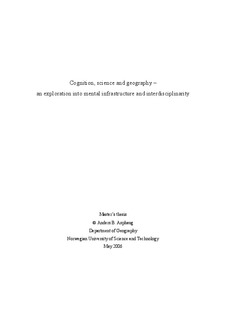Cognition, science and geography: an exploration into mental infrastructure and interdisciplinarity
Master thesis
Permanent lenke
http://hdl.handle.net/11250/265223Utgivelsesdato
2006Metadata
Vis full innførselSamlinger
- Institutt for geografi [1031]
Sammendrag
This text explores the significance of perspectives from the cognitive sciences for interdisciplinarity or cross-domain thinking in science, and particularly in geography.
First interdisciplinarity is examined, describing some of the central conditions that such ventures exist under. The interaction between different conceptual systems is identified as a core issue in interdisciplinarity. By focusing on our conceptual systems the dissertation aims to say something general about interdisciplinarity and science, as well as focusing on what may be considered specific to geographic ways of thought.
The conditions for scientific and cross-domain thinking are explored through an examination of the human mind. The problem of relating our mental microstructures to cultural and scientific phenomena is given particular attention. Evolution, it is argued, has given the human mind an ‘intuitive ontology,’ which has significance for science, especially since it incorporates deeply rooted boundaries between knowledge domains. While this is important, it is incomplete as a view of science or of a discipline. The thesis therefore seeks to supply this theory with as much context as possible in order to get a more complete understanding of scientific activities.
To establish some features of the geographical way of thought, the intellectual history of the discipline is explored. Three features are particularly emphasised, namely its focus on usefulness, on synthesis, and on visual analysis. These features, it is theorised, form important parts of the explanation for why geographers often have sought to transgress boundaries despite the above mentioned intuitive ontology.
The thesis is mainly a theoretical contribution, but has also an empirical component. The Department of Geography at NTNU, Trondheim is described with a dual focus on intellectual characteristics and socio-cultural characteristics. The purpose of this is to better understand the theory about human cognition and geography in light of the complexities of a concrete case. By treating the Department as a complex adaptive system, the many different factors found to be significant are sought treated within one, relatively unified conceptual system.
